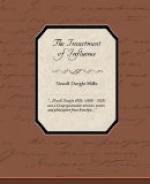In the olden days, when the poisoner was in every palace, the Doge of Venice offered a reward for a crystal goblet that would break the moment a poison touched it. Perhaps the idea was suggested to the Prince because his soul already fulfilled the thought, for one drop of sin always shatters the cup of joy and wastes life’s precious wine. How do events interpret this principle! One day Louis, King of France, was riding in the forest near his gorgeous and guilty palace of Versailles. He met a peasant carrying a coffin. “What did the man die of?” asked the King. “Of hunger,” answered the peasant. But the sound of the hunt was in the King’s ear, and he forgot the cry of want. Soon the day came when the King stood before the guillotine, and with mute appeals for mercy fronted a mob silent as statues, unyielding as stone, grimly waiting to dip the ends of their pikes in regal blood. He gave cold looks; he received cold steel.
Marie Antoinette, riding to Notre Dame for her bridal, bade her soldiers command all beggars, cripples and ragged people to leave the line of the procession. The Queen could not endure for a brief moment the sight of those miserable ones doomed to unceasing squalor and poverty. What she gave others she received herself, for soon, bound in an executioner’s cart, she was riding toward the place of execution midst crowds who gazed upon her with hearts as cold as ice and hard as granite. When Foulon was asked how the starving populace was to live he answered: “Let them eat grass.” Afterward, Carlyle says, the mob, maddened with rage, “caught him in the streets of Paris, hanged him, stuck his head upon a pike, filled his mouth with grass, amid shouts as of Tophet from a grass-eating people.” What kings and princes gave they received. This is the voice of nature and conscience: “Behold, sin crouches at the door!”
This divine principle also explains man’s attitude toward his fellows. The proverb says man makes his own world. Each sees what is in himself, not what is outside. The jaundiced eye yellows all it beholds. The chameleon takes its color from the bark on which it clings. Man gives his color to what his thought is fastened upon. The pessimist’s darkness makes all things dingy. The youth disappointed with his European trip said he was a fool for going. He was, for the reason that he was a fool before he started. He saw nothing without, because he had no vision within. He gave no sight, he received no vision. An artist sees in each Madonna that which compels a rude mob to uncover in prayer, but the savage perceives only a colored canvas. Recently a foreign traveler, writing of his impressions of our city, described it to his fellows as a veritable hades. But his fellow countryman, in a similar volume, recorded his impressions of our art, architecture and interest in education. Each saw that for which he looked.




